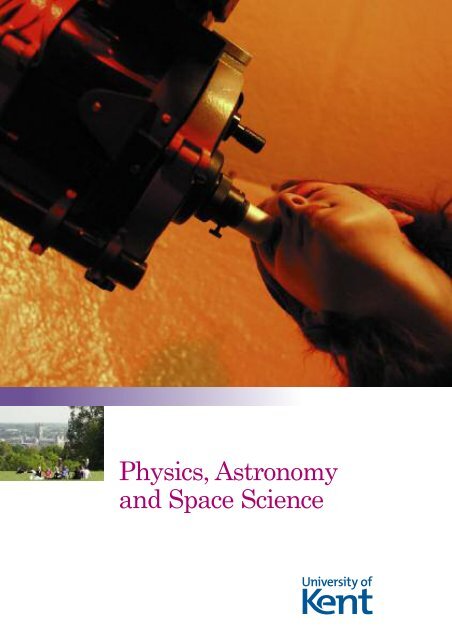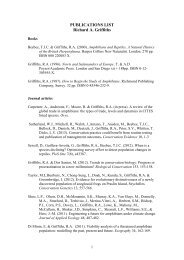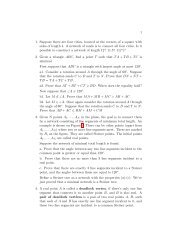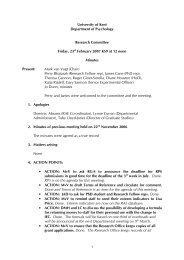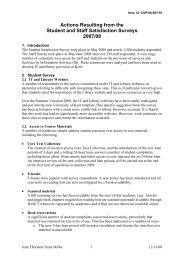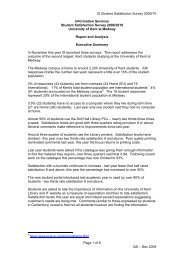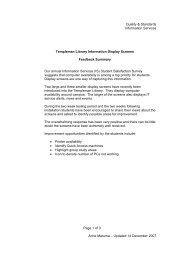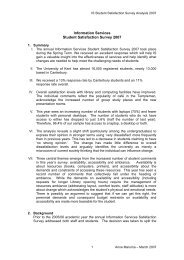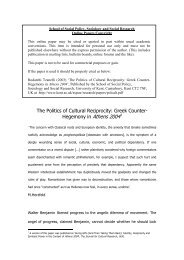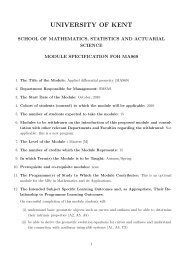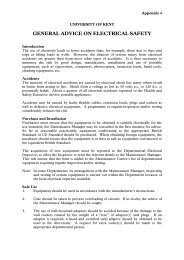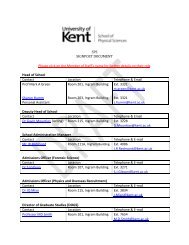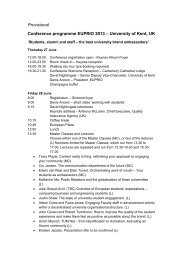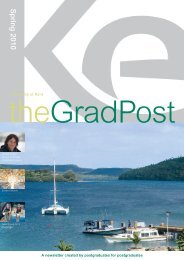Physics, Astronomy and Space Science - University of Kent
Physics, Astronomy and Space Science - University of Kent
Physics, Astronomy and Space Science - University of Kent
You also want an ePaper? Increase the reach of your titles
YUMPU automatically turns print PDFs into web optimized ePapers that Google loves.
<strong>Physics</strong>, <strong>Astronomy</strong><br />
<strong>and</strong> <strong>Space</strong> <strong>Science</strong>
<strong>Physics</strong>, <strong>Astronomy</strong> <strong>and</strong> <strong>Space</strong> <strong>Science</strong><br />
www.kent.ac.uk/physical-sciences/<br />
Why come to <strong>Kent</strong> to study <strong>Physics</strong>,<br />
<strong>Astronomy</strong> <strong>and</strong> <strong>Space</strong> <strong>Science</strong>?<br />
<strong>Physics</strong>, astrophysics,<br />
astronomy <strong>and</strong> space<br />
studies are some <strong>of</strong> the<br />
most fascinating <strong>of</strong> all<br />
scientific disciplines.<br />
<strong>Physics</strong> reaches from the<br />
quark out to the largest<br />
<strong>of</strong> galaxies, encompassing<br />
the length, mass <strong>and</strong><br />
time-scales within these<br />
two extremes. It is no<br />
surprise, then, that at the<br />
heart <strong>of</strong> a pr<strong>of</strong>essional<br />
physicist is a fascination<br />
with, <strong>and</strong> a desire to<br />
underst<strong>and</strong>, the ‘how <strong>and</strong><br />
why’ <strong>of</strong> the material world<br />
around us.<br />
A more specialised area <strong>of</strong> study is<br />
astrophysics which emphasises the<br />
physical concepts <strong>of</strong> the stars <strong>and</strong><br />
galaxies that make up the universe.<br />
<strong>Astronomy</strong> is one <strong>of</strong> the oldest<br />
sciences, practised by most <strong>of</strong> the<br />
world’s ancient civilisations, <strong>and</strong><br />
one <strong>of</strong> the most modern, turning to<br />
high technology <strong>and</strong> the space<br />
programme for many <strong>of</strong> its most<br />
recent discoveries. Studying any, or<br />
all, <strong>of</strong> these areas can quickly take<br />
us to the frontiers <strong>of</strong> scientific<br />
knowledge.<br />
High league table rankings<br />
The School <strong>of</strong> Physical <strong>Science</strong>s<br />
at <strong>Kent</strong> is joint 1st in the country for<br />
job prospects in the 2007 Guardian<br />
<strong>University</strong> Guide.<br />
Exciting range <strong>of</strong> topics<br />
At <strong>Kent</strong>, we <strong>of</strong>fer you the chance to<br />
study all <strong>of</strong> the traditional areas <strong>of</strong><br />
physics – from thermodynamics to<br />
quantum mechanics. And we also<br />
give you the chance to branch out<br />
into more unusual subjects, such as<br />
space studies <strong>and</strong> the structure <strong>of</strong><br />
the universe – a fascinating area<br />
thanks to its constant stream <strong>of</strong><br />
new discoveries.<br />
We bring innovative features into<br />
our teaching. In our projects, for<br />
example, physics is <strong>of</strong>ten applied to<br />
a range <strong>of</strong> situations from films, like<br />
destroying incoming meteorites.<br />
One group tested the physics <strong>of</strong><br />
Robin Hood Prince <strong>of</strong> Thieves by<br />
building a scale model <strong>of</strong> a<br />
mangonel to see whether Kevin<br />
Costner would have been<br />
successfully catapulted over the<br />
fortress wall.<br />
Cutting-edge research<br />
Research at <strong>Kent</strong> is very strong,<br />
with a large number <strong>of</strong> staff <strong>and</strong><br />
postgraduate students. Staff<br />
research is based in three different<br />
groups: the Functional Materials<br />
Group, where we work in a range <strong>of</strong><br />
2
<strong>Physics</strong>, <strong>Astronomy</strong> <strong>and</strong> <strong>Space</strong> <strong>Science</strong><br />
www.kent.ac.uk/physical-sciences/<br />
areas including bioactive materials;<br />
Applied Optics, where we are world<br />
leaders <strong>and</strong> work with the New York<br />
Eye <strong>and</strong> Ear Infirmary; <strong>and</strong> the<br />
Centre for Astrophysics <strong>and</strong><br />
Planetary <strong>Science</strong>, where we<br />
conduct research for NASA <strong>and</strong> the<br />
European <strong>Space</strong> Agency <strong>and</strong> are<br />
leaders in astrobiology.<br />
A lot <strong>of</strong> our research feeds directly<br />
into our teaching, so that your<br />
studies are at the cutting edge <strong>of</strong><br />
the subject. In the final year <strong>of</strong> the<br />
MPhys degree a combination <strong>of</strong><br />
specialist modules <strong>and</strong> an<br />
attachment to one <strong>of</strong> our research<br />
teams opens up avenues for<br />
deeper exploration: you might find<br />
yourself involved in designing<br />
space probe instrumentation, firing<br />
mini meteorites into planetary<br />
surfaces; mapping the retina <strong>of</strong> a<br />
patient’s eye using fibre optics;<br />
modelling the atomic-scale<br />
structure <strong>of</strong> a new engineering<br />
material; or, taking the Channel<br />
Tunnel to Paris for neutronscattering<br />
work. For more<br />
information about our research<br />
projects, see p16.<br />
Did you know...?<br />
We are among the top ten<br />
universities in the UK for<br />
course satisfaction. In the<br />
2007 National Student Survey,<br />
89% <strong>of</strong> full-time students were<br />
‘overwhelmingly satisfied’ with<br />
the quality <strong>of</strong> their courses.<br />
“<strong>Physics</strong> is an excellent<br />
general degree. It gives<br />
you a solid science base<br />
which enables you to turn<br />
your h<strong>and</strong> to anything.”<br />
Mark Burchell,<br />
Pr<strong>of</strong>essor <strong>of</strong> <strong>Space</strong> <strong>Science</strong><br />
3
<strong>Physics</strong>, <strong>Astronomy</strong> <strong>and</strong> <strong>Space</strong> <strong>Science</strong><br />
www.kent.ac.uk/physical-sciences/<br />
Stimulating atmosphere<br />
The School <strong>of</strong> Physical <strong>Science</strong>s is<br />
a friendly department where all our<br />
students are known <strong>and</strong> their<br />
interests <strong>and</strong> strengths can<br />
flourish. Our department prides<br />
itself on its sociable <strong>and</strong> stimulating<br />
atmosphere. There is a lot <strong>of</strong><br />
interaction between students <strong>and</strong><br />
staff <strong>and</strong> one very popular facility is<br />
the Student Room, designed to give<br />
you a place to meet <strong>and</strong> to study.<br />
There are also Open Lectures<br />
that students are welcome to<br />
attend; in 2005, these included<br />
Nobel Laureate, Sir Anthony<br />
Leggett <strong>and</strong> Pr<strong>of</strong>essor John<br />
Zarnecki, Principal Investigator on<br />
the Surface <strong>Science</strong> Package <strong>of</strong> the<br />
Huygens Mission to Titan.<br />
A year in the USA<br />
At <strong>Kent</strong> we have developed an<br />
exchange programme which means<br />
you can spend the third year <strong>of</strong><br />
your degree studying in the USA.<br />
This gives you an excellent chance<br />
to witness their approach to<br />
physics. Over the years we have<br />
established a strong exchange<br />
programme with our partner<br />
universities which include the<br />
Pennsylvania State <strong>University</strong> on<br />
the east coast, the <strong>University</strong> <strong>of</strong><br />
California in Santa Barbara <strong>and</strong><br />
the <strong>University</strong> <strong>of</strong> Indiana at<br />
Bloomington.<br />
Flexible entry<br />
For those who do not have the<br />
formal entry requirements for our<br />
degree programme, we have<br />
devised a Foundation Year that<br />
prepares you for entry on to any <strong>of</strong><br />
our BSc or MPhys programmes.<br />
This is ideal for mature students<br />
returning to full-time education <strong>and</strong><br />
also suitable for those who may not<br />
have the grades required for direct<br />
entry on to the degree programme.<br />
For more information on the<br />
Foundation Year please see p5.<br />
Key employment skills<br />
We want our graduates to be wellequipped<br />
for the challenges <strong>of</strong> the<br />
working world. As well as giving<br />
you a solid grounding in your<br />
subject, we also aim to provide you<br />
with the key skills that can be vital<br />
to a successful career. As a<br />
scientist, it is important that you are<br />
able to communicate effectively, so<br />
we teach students how to give<br />
presentations, write technical<br />
information in an accessible way,<br />
<strong>and</strong> work effectively within a group.<br />
You also become pr<strong>of</strong>icient in Word,<br />
Excel <strong>and</strong> PowerPoint. For final year<br />
MPhys students, we even simulate<br />
a scientific conference, to show you<br />
what it might be like to participate<br />
in the national or international<br />
scientific community.<br />
4
<strong>Physics</strong>, <strong>Astronomy</strong> <strong>and</strong> <strong>Space</strong> <strong>Science</strong><br />
www.kent.ac.uk/physical-sciences/<br />
“In their final-year<br />
research project, students<br />
become closely involved<br />
in contemporary<br />
research. In my research<br />
team – which is focused<br />
on underst<strong>and</strong>ing<br />
modern materials at an<br />
atomistic level – we’ve<br />
had students whose<br />
project work has given<br />
rise to papers in research<br />
journals <strong>and</strong> has<br />
been presented<br />
at international<br />
conferences.”<br />
Good career prospects<br />
According to employment statistics,<br />
<strong>Kent</strong> graduates are doing better<br />
than ever in the changeable job<br />
market. <strong>Physics</strong> provides an<br />
excellent basis for many jobs <strong>and</strong><br />
our graduates’ careers bear this<br />
out. Recent graduates have gone<br />
on to work in a wide range <strong>of</strong><br />
areas including research <strong>and</strong><br />
development, technical<br />
management, the City <strong>and</strong> financial<br />
institutions, computing, s<strong>of</strong>tware<br />
design, the media <strong>and</strong> teaching.<br />
Financial assistance<br />
The degrees at <strong>Kent</strong> are accredited<br />
by the Institute <strong>of</strong> <strong>Physics</strong> which<br />
means that you are eligible to apply<br />
for a means-tested bursary <strong>of</strong>fered<br />
by the Institute. These bursaries are<br />
worth up to £1000 a year <strong>and</strong><br />
available to British <strong>and</strong> Irish students<br />
entering university in 2008 or 2009.<br />
In addition, <strong>Kent</strong>’s School <strong>of</strong><br />
Physical <strong>Science</strong>s <strong>of</strong>fers an<br />
academic scholarship worth £1000<br />
per year. For more details, see p9.<br />
Bob Newport,<br />
Pr<strong>of</strong>essor <strong>of</strong><br />
Materials <strong>Physics</strong><br />
Did you know…?<br />
the School <strong>of</strong> Physical<br />
<strong>Science</strong>s is joint 1st in the<br />
country for job prospects<br />
in the 2007 Guardian<br />
<strong>University</strong> Guide.<br />
5
“The foundation course<br />
gives people the best<br />
possible chance to do a<br />
degree programme <strong>and</strong><br />
some have gone on to<br />
get a first class honours<br />
degree.”<br />
Chris Solomon,<br />
Reader in <strong>Physics</strong><br />
6
<strong>Physics</strong>, <strong>Astronomy</strong> <strong>and</strong> <strong>Space</strong> <strong>Science</strong><br />
www.kent.ac.uk/physical-sciences/<br />
Choosing your<br />
programme<br />
You can take most physicsrelated<br />
subjects as either a<br />
three-year BSc or four-year<br />
MPhys degree. You also<br />
have some flexibility<br />
to switch between<br />
programmes during your<br />
first year <strong>of</strong> study.<br />
The BSc programme <strong>of</strong>fers a broad<br />
training in physics <strong>and</strong> provides an<br />
ideal preparation for a wide range<br />
<strong>of</strong> careers in the manufacturing <strong>and</strong><br />
service industries, education, the<br />
media <strong>and</strong> the financial sector.<br />
In the MPhys programme, core<br />
knowledge <strong>and</strong> skills are enhanced<br />
with the further in-depth training<br />
required for a science-based<br />
career, including the practical<br />
aspects <strong>of</strong> the research process<br />
<strong>and</strong> major projects within the<br />
School’s research groups.<br />
<strong>Physics</strong><br />
This <strong>of</strong>fers you the broadest training<br />
in physics <strong>and</strong> allows you the<br />
maximum choice <strong>of</strong> options.<br />
<strong>Physics</strong> with Astrophysics<br />
In this degree, core physics is<br />
supplemented by astrophysics<br />
courses linking these developments<br />
to the expertise <strong>of</strong> <strong>University</strong> staff,<br />
ranging from solar system<br />
exploration through stellar formation<br />
<strong>and</strong> collapse to the structure <strong>and</strong><br />
evolution <strong>of</strong> the universe. You could<br />
choose this subject if you find<br />
excitement in exploring the universe<br />
but also appreciate the need for<br />
down-to-earth training in physics.<br />
<strong>Physics</strong> with <strong>Space</strong><br />
<strong>Science</strong> <strong>and</strong> Systems<br />
Since the launch <strong>of</strong> the first artificial<br />
satellite in 1957, space technology<br />
<strong>and</strong> space science have played an<br />
increasingly important role in<br />
human activities. Staff in the Centre<br />
for Astrophysics <strong>and</strong> Planetary<br />
<strong>Science</strong> have been closely involved<br />
with European, American <strong>and</strong><br />
Japanese interplanetary <strong>and</strong> near-<br />
Earth missions. The specialist<br />
modules cover all aspects <strong>of</strong><br />
spacecraft design <strong>and</strong> operation<br />
<strong>and</strong> emphasise the importance <strong>of</strong><br />
the interrelationships between<br />
different spacecraft systems. They<br />
introduce aspects <strong>of</strong> space<br />
business, project management <strong>and</strong><br />
related topics which will prepare<br />
graduates for employment in<br />
space-related industries.<br />
<strong>Physics</strong> with Forensic <strong>Science</strong><br />
This unique degree gives you the<br />
chance to combine the study <strong>of</strong><br />
physics with the applications it has<br />
in solving a range <strong>of</strong> problems from<br />
air crashes to blood splatter<br />
patterns. By combining the<br />
practical techniques <strong>of</strong> the forensic<br />
scientist with a good background in<br />
physics, you develop a broad <strong>and</strong><br />
useful range <strong>of</strong> skills. This course is<br />
for those who have an interest in<br />
forensic science <strong>and</strong> realise that<br />
combining that interest with a<br />
physics degree gives you a real<br />
advantage in the field as well as<br />
<strong>of</strong>fering a fascinating degree. We<br />
have an innovative research team in<br />
facial recognition, developing new<br />
methods for producing an image <strong>of</strong><br />
a suspect’s face. For more<br />
information see page 15.<br />
<strong>Astronomy</strong>, <strong>Space</strong> <strong>Science</strong><br />
<strong>and</strong> Astrophysics<br />
This is a fantastic programme for<br />
those who are inspired by the<br />
wonders <strong>and</strong> vastness <strong>of</strong> the<br />
universe. In this course there are<br />
opportunities to investigate the<br />
possibilities <strong>of</strong> life elsewhere in the<br />
universe. You get involved with real<br />
space missions from ESA <strong>and</strong><br />
NASA <strong>and</strong> can work on real Hubble<br />
Telescope data.<br />
Year in the USA<br />
Those on a four-year MPhys<br />
programme can opt to spend their<br />
third year in the USA.<br />
BSc Honours degree with<br />
Foundation Year<br />
This four-year programme is<br />
designed for students who do<br />
not possess the formal entry<br />
requirements for a physics degree<br />
– or overseas students who require<br />
additional preparation in science<br />
or English language. The<br />
mathematics, physics, electronics,<br />
computing <strong>and</strong> laboratory practical<br />
work provide an ideal preparation<br />
for any <strong>of</strong> our BSc or MPhys<br />
programmes.<br />
7
<strong>Physics</strong>, <strong>Astronomy</strong> <strong>and</strong> <strong>Space</strong> <strong>Science</strong><br />
www.kent.ac.uk/physical-sciences/<br />
Studying<br />
at Stage 1<br />
Stage 1 represents the<br />
first year <strong>of</strong> your degree.<br />
The following modules are<br />
compulsory for all first year<br />
students:<br />
• Skills for Physicists<br />
• Mathematics<br />
• <strong>Physics</strong><br />
• Astrophysics, <strong>Space</strong> <strong>Science</strong><br />
<strong>and</strong> Cosmology.<br />
In addition students taking <strong>Physics</strong><br />
with Forensic <strong>Science</strong> take:<br />
• Molecules, Matter <strong>and</strong> Energy<br />
• Introduction to Forensic <strong>Science</strong>.<br />
All other students take:<br />
• Computing Skills<br />
• Disasters (for students with<br />
A level maths or students who<br />
have passed the <strong>Physics</strong><br />
Foundation Year)<br />
Modules: Stage 1<br />
Skills for Physicists<br />
This module provides you with the<br />
basic experimental, statistical, data<br />
analysis, <strong>and</strong> communication skills<br />
required in physics. You develop a<br />
range <strong>of</strong> subject-specific <strong>and</strong> key<br />
transferable skills including ICT <strong>and</strong><br />
communication skills in addition to<br />
experimental laboratory skills in<br />
physics.<br />
Mathematics<br />
This module aims to provide you<br />
with the necessary mathematical<br />
tools to enable a deeper<br />
underst<strong>and</strong>ing <strong>of</strong> physics, <strong>and</strong> to<br />
lay a firm foundation in maths so<br />
you can make confident progress<br />
into the more advanced<br />
mathematical subjects. It covers<br />
derivatives <strong>and</strong> integrals,<br />
elementary functions, functions <strong>of</strong> a<br />
single variable, complex numbers,<br />
vectors, matrices, differential<br />
equations, partial derivatives,<br />
differentials <strong>and</strong> integrals, polar<br />
co-ordinates <strong>and</strong> vector calculus.<br />
<strong>Physics</strong><br />
The module gives you an<br />
introduction to the foundations <strong>of</strong><br />
physics <strong>and</strong> forms a firm basis on<br />
which you can build in later years <strong>of</strong><br />
your degree. You gain an<br />
underst<strong>and</strong>ing <strong>of</strong> the law <strong>and</strong><br />
concepts <strong>of</strong> mechanics, waves,<br />
electromagnetism <strong>and</strong><br />
thermodynamics <strong>and</strong> their<br />
application to the study <strong>of</strong><br />
properties <strong>of</strong> solids <strong>and</strong> gases,<br />
electrical circuits <strong>and</strong> optics.<br />
Astrophysics, <strong>Space</strong> <strong>Science</strong>s<br />
<strong>and</strong> Cosmology<br />
A basic background in astrophysics<br />
is provided in this module, covering<br />
subjects ranging from the sun <strong>and</strong><br />
the solar system to stars <strong>and</strong> stellar<br />
systems. It also introduces you to<br />
particle physics <strong>and</strong> cosmology.<br />
The space sciences aspect<br />
concentrates on space missions<br />
<strong>and</strong> exploring the solar system.<br />
Molecules, Matter <strong>and</strong> Energy<br />
Covering topics including<br />
thermodynamics; atomic <strong>and</strong><br />
molecular structure; <strong>and</strong> gases,<br />
liquids, solutions <strong>and</strong> solids, this<br />
module ensures you have the ability<br />
to demonstrate knowledge <strong>and</strong><br />
underst<strong>and</strong>ing <strong>of</strong> essential facts,<br />
concepts, principles <strong>and</strong> theories<br />
<strong>and</strong> enables you to solve qualitative<br />
<strong>and</strong> quantitative problems.<br />
Introduction to Forensic <strong>Science</strong><br />
This module looks at the role <strong>of</strong><br />
forensic scientists <strong>and</strong> the<br />
procedures they are involved in at<br />
crime scenes. Topics include:<br />
evidence <strong>and</strong> the scene <strong>of</strong> the<br />
crime; document examination; fires,<br />
explosions <strong>and</strong> firearms; drugs <strong>of</strong><br />
abuse, alcohol <strong>and</strong> forensic<br />
toxicology; body fluids; the<br />
presentation <strong>of</strong> forensic evidence.<br />
8
Bursaries<br />
<strong>and</strong><br />
scholarships<br />
Computing Skills<br />
The module introduces you to the<br />
concept <strong>of</strong> programming<br />
languages, <strong>and</strong> to Fortran in<br />
particular. You learn how to use the<br />
UNIX operating system, including<br />
the text editor, the directory system,<br />
basic utilities, <strong>and</strong> the edit-compilerun<br />
cycle. You also learn library<br />
routines such as NAG <strong>and</strong> graph<br />
plotting using GNUPLOT.<br />
Disasters<br />
(For students with A level maths or<br />
who have passed the Foundation<br />
year.) You study disasters, both<br />
‘natural’ <strong>and</strong> as a result <strong>of</strong> human<br />
participation, for example shipping<br />
disasters, the Chernobyl explosion,<br />
impacts from space <strong>and</strong> stock<br />
market crashes. Through this study<br />
you develop a perspective on<br />
scientific reasoning <strong>and</strong> are<br />
encouraged to reflect on the<br />
limitations <strong>of</strong> science <strong>and</strong> the<br />
limited scope <strong>of</strong> judgements in<br />
scientific <strong>and</strong> technical contexts.<br />
Institute <strong>of</strong> <strong>Physics</strong><br />
Our degrees at <strong>Kent</strong> are accredited<br />
by the Institute <strong>of</strong> <strong>Physics</strong> which<br />
means that <strong>Kent</strong> students are<br />
eligible to apply for a means-tested<br />
bursary <strong>of</strong>fered by the Institute. The<br />
bursaries are up to £1000 a year<br />
<strong>and</strong> available to British <strong>and</strong> Irish<br />
students who are studying physics<br />
in the UK <strong>and</strong> Irel<strong>and</strong> <strong>and</strong> entering<br />
university in 2008 or 2009. For<br />
details see http://education.iop.org/<br />
Schools/suptstu/ubs.html<br />
<strong>University</strong> <strong>of</strong> <strong>Kent</strong><br />
<strong>Kent</strong>’s School <strong>of</strong> Physical <strong>Science</strong>s<br />
<strong>of</strong>fers a scholarship worth £1000<br />
per year to an exceptional student<br />
in the School <strong>of</strong> Physical <strong>Science</strong>.<br />
Students who expect to attain<br />
300 points at A/AS level (or its<br />
equivalent) can apply by submitting<br />
a portfolio <strong>of</strong> experimental lab or<br />
project reports, (between five <strong>and</strong><br />
10 pages long). If you wish, these<br />
may be taken from a current or a<br />
previous course. We are looking for<br />
evidence <strong>of</strong> exceptional<br />
experimental skills as well as an<br />
insightful analysis <strong>of</strong> laboratory<br />
data.<br />
Initially, the scholarship is awarded<br />
for the first year <strong>of</strong> full-time study. It<br />
can be then renewed on a year-byyear<br />
basis, for the duration <strong>of</strong> the<br />
full-time degree programme.<br />
However, to renew the scholarship<br />
the student needs to achieve a<br />
distinction at the end <strong>of</strong> each stage<br />
<strong>of</strong> study.<br />
9
<strong>Physics</strong>, <strong>Astronomy</strong> <strong>and</strong> <strong>Space</strong> <strong>Science</strong><br />
www.kent.ac.uk/physical-sciences/<br />
Studying at<br />
Stages 2<br />
Stage 2 represents the<br />
second year <strong>of</strong> your<br />
degree programme.<br />
Students taking the BSc or<br />
MPhys in <strong>Physics</strong>, <strong>Physics</strong> with<br />
Astrophysics, <strong>Physics</strong> with <strong>Space</strong><br />
<strong>Science</strong> <strong>and</strong> Systems or <strong>Physics</strong><br />
with Forensic <strong>Science</strong> take the<br />
following modules:<br />
• <strong>Physics</strong> Laboratory II (two units)<br />
• Quantum <strong>Physics</strong><br />
• Atomic <strong>and</strong> Nuclear <strong>Physics</strong><br />
• Optics <strong>and</strong> Electromagnetism<br />
• Medical <strong>Physics</strong><br />
• Mathematical Techniques <strong>and</strong><br />
Differential Equations.<br />
Students taking <strong>Physics</strong>, <strong>Physics</strong><br />
with a Year in the USA, or MPhys<br />
also take one <strong>of</strong> the following:<br />
• The Multiwavelength Universe<br />
<strong>and</strong> Exoplanets<br />
• <strong>Space</strong>craft Design <strong>and</strong><br />
Operations<br />
• Forensic Physical Methods.<br />
Students taking <strong>Physics</strong> with<br />
Astrophysics also take:<br />
• The Multiwavelength Universe<br />
<strong>and</strong> Exoplanets.<br />
10<br />
Students taking <strong>Physics</strong> with <strong>Space</strong><br />
<strong>Science</strong> <strong>and</strong> Systems BSc or<br />
MPhys also take:<br />
• <strong>Space</strong>craft Design <strong>and</strong><br />
Operations.<br />
Students taking <strong>Physics</strong> with<br />
Forensic <strong>Science</strong> may take<br />
modules such as:<br />
• Forensic Physical Methods<br />
• Forensic Ballistics <strong>and</strong><br />
Collision Analysis.<br />
<strong>Astronomy</strong>, <strong>Space</strong> <strong>Science</strong> &<br />
Astrophysics students take the<br />
following modules:<br />
• <strong>Physics</strong> Lab II<br />
• Quantum <strong>Physics</strong><br />
• Optics <strong>and</strong> Electromagnetism<br />
• Mathematical Techniques <strong>and</strong><br />
Differential Equations<br />
• The Multiwavelength Universe<br />
<strong>and</strong> Exoplanets<br />
• <strong>Space</strong>craft Design <strong>and</strong><br />
Operations<br />
• Multimedia for <strong>Astronomy</strong>,<br />
Astrophysics <strong>and</strong> Planetary<br />
<strong>Science</strong>.<br />
“In my second year, I<br />
attended lectures by<br />
pr<strong>of</strong>essional medical<br />
physicists. This was<br />
particularly useful. It<br />
gave me an insight into<br />
medical physics as a<br />
career.”<br />
Roxanne Potts,<br />
Trainee Medical Physicist,<br />
Maidstone NHS Trust<br />
Modules: Stage 2<br />
<strong>Physics</strong> Laboratory II<br />
This double module gives you the<br />
opportunity to practise the<br />
necessary observational, recording,<br />
analytical <strong>and</strong> presentation skills<br />
required by a modern physicist.<br />
You carry out a series <strong>of</strong> extended<br />
experiments (each over a two-week<br />
period) <strong>and</strong> two communication<br />
exercises.<br />
Forensic Ballistics <strong>and</strong><br />
Collision Analysis<br />
The topics include wounds<br />
<strong>and</strong> injury evidence, firearms<br />
identification, bullets <strong>and</strong> debris,<br />
laws <strong>of</strong> motion, vector resolution,<br />
<strong>and</strong> scene analysis. You build up<br />
a knowledge <strong>of</strong> major incident<br />
management with reference to<br />
forensic evidence recovery. You<br />
also learn to collate <strong>and</strong> present<br />
findings within judicial constraints.<br />
Quantum <strong>Physics</strong><br />
Quantum mechanics is arguably<br />
the most fundamental discovery <strong>of</strong><br />
20th century physics. This module<br />
will provide an introduction to<br />
quantum physics developing the<br />
concept <strong>of</strong> the wave function <strong>and</strong><br />
the methods <strong>of</strong> solving simple<br />
physics problems using<br />
a quantum formulation. It provides<br />
a conceptual background to the<br />
ideas <strong>of</strong> wave particle duality<br />
leading to the formulation <strong>of</strong> the<br />
Schrödinger equation. You learn<br />
how to solve simple problems <strong>and</strong><br />
to underst<strong>and</strong> the origins <strong>of</strong><br />
quantum numbers in one <strong>and</strong><br />
three-dimensional systems.
<strong>Physics</strong>, <strong>Astronomy</strong> <strong>and</strong> <strong>Space</strong> <strong>Science</strong><br />
www.kent.ac.uk/physical-sciences/<br />
Atomic <strong>and</strong> Nuclear <strong>Physics</strong><br />
Atomic <strong>and</strong> nuclear processes are<br />
fundamental to underst<strong>and</strong>ing the<br />
universe around us. The module will<br />
give you an underst<strong>and</strong>ing <strong>of</strong> the<br />
way in which quantum numbers<br />
cover the properties <strong>of</strong> atoms <strong>and</strong><br />
nuclei, <strong>and</strong> an appreciation <strong>of</strong> how<br />
the theory is related to experimental<br />
observation.<br />
Optics <strong>and</strong> Electromagnetism<br />
This module provides a conceptual<br />
framework <strong>of</strong> electromagnetism at<br />
the level needed for underst<strong>and</strong>ing<br />
the propagation <strong>of</strong> electromagnetic<br />
waves in free space. The material<br />
relates optics to electromagnetism<br />
<strong>and</strong> provides an excellent<br />
grounding for underst<strong>and</strong>ing lasers<br />
<strong>and</strong> modern optics.<br />
Medical <strong>Physics</strong><br />
You gain a broad overview <strong>of</strong> the<br />
role <strong>of</strong> physics <strong>and</strong> the physicist in<br />
modern medicine. The module sets<br />
out the physical <strong>and</strong> mathematical<br />
essentials <strong>of</strong> major diagnostic <strong>and</strong><br />
therapeutic techniques such as<br />
radiology, MRI, <strong>and</strong> ultrasound.<br />
The module involves several<br />
contributors from the Department<br />
<strong>of</strong> Medical <strong>Physics</strong> at the <strong>Kent</strong> <strong>and</strong><br />
Canterbury Hospital.<br />
Mathematical Techniques <strong>and</strong><br />
Differential Equations<br />
This unit builds on the mathematics<br />
you studied in the first year <strong>and</strong><br />
concentrates on those techniques<br />
that any physicist needs for<br />
problem solving in a whole range <strong>of</strong><br />
physical applications. This module<br />
treats mathematics as a tool to<br />
solve advanced physical problems<br />
such as those found in quantum<br />
mechanics or optics. You also learn<br />
how to use computers to model<br />
physical phenomena with MAPLE.<br />
The Multiwavelength Universe<br />
<strong>and</strong> Exoplanets<br />
This module builds on work you<br />
have done in Stage 1 <strong>and</strong> provides<br />
a basic but rigorous grounding in<br />
observational, computational <strong>and</strong><br />
theoretical aspects <strong>of</strong> astrophysics.<br />
You develop a clear underst<strong>and</strong>ing<br />
<strong>of</strong> the fundamentals <strong>of</strong> making<br />
astronomical observations across<br />
the whole electromagnetic<br />
spectrum. You also look at<br />
observational characteristics <strong>of</strong><br />
stars <strong>and</strong> how their physical<br />
structures are derived from<br />
observation <strong>and</strong> using simple<br />
models. You study the origin<br />
<strong>and</strong> evolution <strong>of</strong> solar systems <strong>and</strong><br />
evaluate claims for evidence <strong>of</strong><br />
solar systems other than our own.<br />
<strong>Space</strong>craft Design<br />
<strong>and</strong> Operations<br />
In this module you gain a basic<br />
underst<strong>and</strong>ing <strong>of</strong> the major<br />
subsystems <strong>of</strong> a spacecraft system<br />
<strong>and</strong> spacecraft trajectory <strong>and</strong><br />
orbits, including interplanetary<br />
orbits, launch phase <strong>and</strong> altitude<br />
control. You also look at space as a<br />
business/commercial opportunity<br />
<strong>and</strong> become familiar with basic<br />
management tools for planning<br />
work. You develop an<br />
underst<strong>and</strong>ing <strong>of</strong> the way in which<br />
space missions are configured both<br />
from the point <strong>of</strong> view <strong>of</strong> the<br />
constituent subsystems <strong>and</strong> the<br />
mission pr<strong>of</strong>ile including the<br />
influence <strong>of</strong> the space environment.<br />
Forensic Physical Methods<br />
This module outlines <strong>and</strong> defines<br />
the scope <strong>of</strong> forensic physical<br />
methods <strong>and</strong> encourages you to<br />
think critically in relation to these<br />
methods <strong>and</strong> their application. You<br />
also look at new developments in<br />
forensic physical methods. Areas<br />
covered include, crime scene<br />
management, footprints, marks <strong>and</strong><br />
impressions, fingerprint recovery<br />
<strong>and</strong> digital forensics.<br />
Multimedia for <strong>Astronomy</strong>,<br />
Astrophysics <strong>and</strong> Planetary<br />
<strong>Science</strong><br />
This module focuses on the use <strong>of</strong><br />
multimedia techniques applied to<br />
astronomical data, <strong>and</strong> data<br />
processing. You discover how to<br />
use the internet to access<br />
astronomical databases <strong>and</strong> go on<br />
to cover a range <strong>of</strong> topics<br />
including: deconvolution, as used<br />
by the Hubble <strong>Space</strong> Telescope for<br />
image enhancement; astrometry,<br />
the measuring <strong>of</strong> the co-ordinates<br />
<strong>of</strong> celestial objects from images;<br />
photometry, determining<br />
magnitudes <strong>of</strong> variable stars; <strong>and</strong><br />
image analysis which covers the<br />
quantifying <strong>of</strong> digital imagery.<br />
Continued overleaf<br />
11
<strong>Physics</strong>, <strong>Astronomy</strong> <strong>and</strong> <strong>Space</strong> <strong>Science</strong><br />
www.kent.ac.uk/physical-sciences/<br />
Studying at<br />
Stages 3 <strong>and</strong> 4<br />
Stage 3 represents the third<br />
year <strong>of</strong> four-year degree<br />
courses <strong>and</strong> the final year <strong>of</strong><br />
three-year courses. Stage 4<br />
represents the final year <strong>of</strong><br />
four-year courses.<br />
Stage 3<br />
BSc students in <strong>Physics</strong>, <strong>Physics</strong><br />
with Astrophysics <strong>and</strong> <strong>Physics</strong> with<br />
<strong>Space</strong> <strong>Science</strong> <strong>and</strong> Systems take the<br />
following modules:<br />
• <strong>Physics</strong> Problem Solving<br />
• <strong>Physics</strong> Group Project<br />
• Relativity, Optics <strong>and</strong> Maxwell’s<br />
Equations<br />
• Thermal <strong>and</strong> Statistical <strong>Physics</strong><br />
• Solid State <strong>Physics</strong><br />
• <strong>Physics</strong> Project Laboratory<br />
• Image Processing.<br />
<strong>Physics</strong> students also take:<br />
• Numerical <strong>and</strong> Computational<br />
Methods.<br />
<strong>Physics</strong> with Astrophysics students<br />
also take:<br />
• Stars, Galaxies <strong>and</strong> the Universe.<br />
<strong>Physics</strong> with <strong>Space</strong> <strong>Science</strong> <strong>and</strong><br />
Systems students also take:<br />
• The Sun, the Earth <strong>and</strong> Mars.<br />
<strong>Astronomy</strong>, <strong>Space</strong> <strong>Science</strong> &<br />
Astrophysics students take the<br />
following modules:<br />
• <strong>Physics</strong> Group Project<br />
• Relativity, Optics <strong>and</strong> Maxwell’s<br />
Equations<br />
• Thermal <strong>and</strong> Statistical <strong>Physics</strong><br />
• Stars, Galaxies <strong>and</strong> the Universe<br />
• The Sun, the Earth <strong>and</strong> Mars<br />
• <strong>Physics</strong> Literature Review<br />
12<br />
• <strong>Physics</strong> Project Laboratory<br />
• Image Processing.<br />
<strong>Physics</strong> with Forensic <strong>Science</strong><br />
students may take modules<br />
such as:<br />
• Forensic Archaeology<br />
• Fires <strong>and</strong> Explosions.<br />
Those on MPhys courses take the<br />
same core modules in their third<br />
year as BSc students but replace<br />
the <strong>Physics</strong> Group Project <strong>and</strong> the<br />
<strong>Physics</strong> Project Laboratory with:<br />
• <strong>Physics</strong> 3rd Year Project<br />
• Physical <strong>Science</strong> Research<br />
Planning.<br />
Stage 4<br />
In their final year those taking a<br />
four-year MPhys degree take the<br />
following modules:<br />
• <strong>Physics</strong> Research Project<br />
• Elementary Particles<br />
• <strong>Space</strong> <strong>Astronomy</strong> <strong>and</strong> Solar<br />
System <strong>Science</strong>.<br />
<strong>Physics</strong> students also take:<br />
• Quantum Mechanics<br />
• Topics in Functional Materials<br />
<strong>Physics</strong> with Astrophysics<br />
students also take:<br />
• Quantum Mechanics<br />
• Advanced Cosmology <strong>and</strong> the<br />
Interstellar Medium.<br />
<strong>Physics</strong> with <strong>Space</strong> <strong>Science</strong> <strong>and</strong><br />
Systems students may take<br />
modules such as:<br />
• Quantum Mechanics<br />
• The Sun, the Earth <strong>and</strong> Mars<br />
• Rocketry <strong>and</strong> Human<br />
<strong>Space</strong>flight.<br />
<strong>Astronomy</strong>, <strong>Space</strong> <strong>Science</strong> <strong>and</strong><br />
Astrophysics students may also take<br />
modules such as:<br />
• The Sun, the Earth <strong>and</strong> Mars.<br />
• Advanced Cosmology <strong>and</strong> the<br />
Interstellar Medium<br />
• Rocketry <strong>and</strong> Human <strong>Space</strong>flight.<br />
Modules: Stage 3<br />
<strong>Physics</strong> Problem Solving<br />
The module consists <strong>of</strong> classes<br />
where you work in small groups on<br />
set problem sheets that contain<br />
either exam-style questions or<br />
general physics problems. The idea<br />
<strong>of</strong> working in small groups is that you<br />
can talk to each other as you learn<br />
the techniques necessary to solve<br />
general problems. A member <strong>of</strong> staff<br />
<strong>and</strong> an assistant attend each class<br />
<strong>and</strong> <strong>of</strong>fer advice as needed.<br />
<strong>Physics</strong> Group Project<br />
The project gives you the opportunity<br />
to work together to plan, research<br />
<strong>and</strong> conduct a short programme <strong>of</strong><br />
work. You can choose from a wide<br />
range <strong>of</strong> topics <strong>and</strong> produce your<br />
final report in written, oral, computer<br />
or video form, depending on the<br />
nature <strong>of</strong> the project.<br />
Relativity, Optics <strong>and</strong><br />
Maxwell’s Equations<br />
You extend your underst<strong>and</strong>ing <strong>of</strong><br />
Maxwell’s equations <strong>and</strong> their<br />
relationship to the other laws <strong>of</strong><br />
electromagnetism. It also includes<br />
such topics as dielectric media,<br />
polarisation, electromagnetic waves<br />
at a vacuum-dielectric interface,<br />
failure <strong>of</strong> attempts to detect ether,<br />
<strong>and</strong> the representation <strong>of</strong> polarisation<br />
in optics. Special relativity is also<br />
discussed in depth.
<strong>Physics</strong>, <strong>Astronomy</strong> <strong>and</strong> <strong>Space</strong> <strong>Science</strong><br />
www.kent.ac.uk/physical-sciences/<br />
Thermal <strong>and</strong> Statistical <strong>Physics</strong><br />
This module covers<br />
thermodynamics, basic statistical<br />
concepts, semi-classical perfect<br />
gases, quantum statistics <strong>of</strong> perfect<br />
gases <strong>and</strong> transport properties <strong>of</strong><br />
gases <strong>and</strong> solids. We also look at<br />
physical phenomena such as<br />
superfluidity <strong>and</strong> Bose-Einstein<br />
condensation.<br />
Solid State <strong>Physics</strong><br />
In this module you gain an<br />
increased underst<strong>and</strong>ing <strong>of</strong> the<br />
nature <strong>and</strong> structure <strong>of</strong> different<br />
types <strong>of</strong> solid materials, including<br />
magnetic materials, <strong>and</strong> <strong>of</strong> the<br />
b<strong>and</strong> structure <strong>of</strong> conducting<br />
materials. You learn how to explain<br />
the operation <strong>of</strong> simple<br />
semiconductor devices in terms <strong>of</strong><br />
b<strong>and</strong> structure concepts. Topics<br />
include crystal structure,<br />
b<strong>and</strong> theory <strong>of</strong> solids,<br />
semiconductor materials <strong>and</strong><br />
magnetic properties<br />
<strong>of</strong> materials.<br />
<strong>Physics</strong> Project Laboratory<br />
The module is divided into two<br />
parts. In the first part you work in<br />
the laboratory on a series <strong>of</strong> twoweek<br />
experiments; in the second<br />
part, you work on longer, more<br />
open-ended mini-projects, where<br />
you are given only a brief<br />
introduction to the topic to be<br />
investigated. You gain invaluable<br />
experience in laboratory-based<br />
experiments <strong>and</strong> also learn to<br />
present your research in a written<br />
report.<br />
Image Processing<br />
In this module you learn about<br />
the key principles <strong>of</strong> imaging<br />
<strong>and</strong> image processing, <strong>and</strong> its<br />
real-world applications. You go<br />
on to test some <strong>of</strong> these<br />
principles <strong>and</strong> discover how they<br />
can be used in a practical way.<br />
You are introduced to the<br />
MATLAB programming language<br />
which allows you to implement<br />
many <strong>of</strong> the image processing<br />
techniques discussed.<br />
Numerical <strong>and</strong><br />
Computational Methods<br />
The aim <strong>of</strong> this module is to<br />
introduce you to some <strong>of</strong> the<br />
more advanced numerical<br />
techniques <strong>of</strong> relevance to<br />
mathematical physics <strong>and</strong> to<br />
illustrate these techniques with<br />
appropriate examples classes<br />
<strong>and</strong> computing console<br />
sessions.<br />
Stars, Galaxies <strong>and</strong><br />
the Universe<br />
You gain a knowledge <strong>of</strong> the<br />
internal structure <strong>of</strong> stars <strong>and</strong><br />
how they are derived, the<br />
processes by which energy is<br />
produced <strong>and</strong> transferred within<br />
them <strong>and</strong> the properties <strong>of</strong> the<br />
possible evolutionary end states.<br />
An underst<strong>and</strong>ing <strong>of</strong> the<br />
fundamentals <strong>of</strong> general relativity<br />
<strong>and</strong> its use in underst<strong>and</strong>ing the<br />
properties <strong>and</strong> evolution <strong>of</strong> the<br />
universe is also developed as<br />
well as an underst<strong>and</strong>ing <strong>of</strong> the<br />
structure <strong>and</strong> evolution <strong>of</strong> the<br />
universe, from fundamental<br />
particles, to individual stars, to<br />
galaxies <strong>and</strong> the universe itself.<br />
The Sun, the Earth <strong>and</strong> Mars<br />
This module enables you to gain an<br />
appreciation <strong>of</strong> the physical<br />
properties <strong>and</strong> processes <strong>of</strong> the<br />
sun, <strong>and</strong> its interaction with the<br />
Earth’s environment. You study how<br />
spacecraft are used with the Earth’s<br />
environment for specific purposes<br />
<strong>and</strong> what instruments they can<br />
carry. You take a critical look at a<br />
current field <strong>of</strong> planetary<br />
exploration, focusing on Mars, <strong>and</strong><br />
develop an underst<strong>and</strong>ing <strong>of</strong><br />
impact hazards to spacecraft.<br />
<strong>Physics</strong> Literature Review<br />
You gain the tools to carry out a<br />
scientific literature review <strong>and</strong> an indepth<br />
investigation <strong>of</strong> a particular<br />
topic. Areas covered include a<br />
guide to web-based <strong>and</strong><br />
multimedia libraries; an introduction<br />
to the main scientific journals; an<br />
example <strong>of</strong> how to research a topic<br />
<strong>and</strong> how to order the information<br />
obtained; <strong>and</strong> discussion <strong>of</strong> how to<br />
prepare a dissertation.<br />
<strong>Physics</strong> 3rd Year Project<br />
This module is aimed at those<br />
students intending to take an<br />
MPhys <strong>and</strong> gives them the<br />
opportunity to deepen their<br />
knowledge <strong>of</strong> a specialised field.<br />
A choice <strong>of</strong> projects is made<br />
available <strong>and</strong> may include topics<br />
such as experimental measurement<br />
<strong>and</strong> observation, the design <strong>and</strong><br />
construction <strong>of</strong> electronic devices<br />
<strong>and</strong> the development <strong>and</strong><br />
evaluation <strong>of</strong> new teaching aids.<br />
Continued overleaf<br />
13
<strong>Physics</strong>, <strong>Astronomy</strong> <strong>and</strong> <strong>Space</strong> <strong>Science</strong><br />
www.kent.ac.uk/physical-sciences/<br />
Physical <strong>Science</strong><br />
Research Planning<br />
You develop skills related to the<br />
preparation <strong>of</strong> a research proposal.<br />
You learn how to search <strong>and</strong> retrieve<br />
information from locations such as<br />
books, databases <strong>and</strong> websites –<br />
<strong>and</strong> compile a pr<strong>of</strong>essionallyproduced<br />
document such as a grant<br />
proposal for funding a research<br />
activity. You present your grant<br />
proposal to members <strong>of</strong> staff which<br />
gives you the chance to develop<br />
your presentation skills.<br />
Forensic Archaeology<br />
You learn about the advantages to<br />
be gained from using modern<br />
scientific archaeological methods.<br />
Topics include techniques such as<br />
seismic detection, nuclear decay<br />
dating, DNA pr<strong>of</strong>iling <strong>and</strong> you look<br />
at how they are applicable to the<br />
non-invasive detection <strong>of</strong><br />
archaeological remains.<br />
Fires <strong>and</strong> Explosions<br />
Investigating the causes <strong>of</strong> fires is<br />
one <strong>of</strong> the most difficult studies<br />
undertaken by forensic scientists.<br />
This module looks at combustion<br />
<strong>and</strong> explosion, flammability, ignition<br />
<strong>and</strong> chain reactions. The forensic<br />
aspects will be illustrated with<br />
case studies.<br />
Modules: MPhys final year<br />
<strong>Physics</strong> Research Project<br />
All MPhys students carry out a<br />
laboratory-based project, related to<br />
their degree specialism. The<br />
projects involve a combination <strong>of</strong><br />
some or all <strong>of</strong>: literature search <strong>and</strong><br />
critique, laboratory work, computing<br />
14<br />
<strong>and</strong> data analysis. The majority <strong>of</strong><br />
the projects relate directly to the<br />
research conducted in the<br />
department (Applied Optics,<br />
Materials <strong>Physics</strong> or <strong>Space</strong> <strong>Science</strong><br />
<strong>and</strong> Astrophysics) <strong>and</strong> you work<br />
within the research laboratories.<br />
Often students’ work leads to<br />
publication in scientific journals.<br />
Elementary Particles<br />
This module presents you with a<br />
survey <strong>of</strong> the current underst<strong>and</strong>ing<br />
<strong>of</strong> the fundamental constituents <strong>of</strong><br />
matter; outlines the st<strong>and</strong>ard model<br />
<strong>of</strong> quarks, leptons <strong>and</strong> gauge fields,<br />
including electroweak unified theory;<br />
<strong>and</strong> familiarises you with how a<br />
particle physics experiment works.<br />
<strong>Space</strong> <strong>Astronomy</strong> <strong>and</strong> Solar<br />
System <strong>Science</strong><br />
How can astronomy be carried out<br />
from Earth orbit <strong>and</strong> how can the<br />
solar system be explored by<br />
spacecraft? How has our solar<br />
system evolved <strong>and</strong> what is its<br />
composition? This module looks at<br />
space astronomy, the exploration<br />
<strong>of</strong> the solar system, solar system<br />
evolution, extra-solar planets <strong>and</strong><br />
special topics including the Kuiper<br />
Belt, Titan, solar system dust,<br />
terrestrial impacts <strong>and</strong> a current<br />
solar system science space mission.<br />
Quantum Mechanics<br />
You gain a background in quantum<br />
mechanics sufficient for continuing<br />
into a research career, <strong>and</strong> an<br />
appreciation <strong>of</strong> some <strong>of</strong> the<br />
applications <strong>and</strong> philosophical<br />
questions it raises. Starting out from<br />
Schrodinger’s equation <strong>and</strong><br />
probability interpretation <strong>of</strong> wave<br />
functions you will encounter the<br />
Dirac notation, the uncertainty<br />
principle <strong>and</strong> the conservation<br />
laws. You also look at angular<br />
momentum, orbital states, spin<br />
states <strong>and</strong> approximation methods.<br />
Topics in Functional Materials<br />
This module provides you with a<br />
general appreciation <strong>of</strong> materials,<br />
<strong>and</strong> an underst<strong>and</strong>ing <strong>of</strong> current<br />
topics <strong>of</strong> interest in materials<br />
research. You develop an<br />
awareness <strong>of</strong> the applications <strong>of</strong><br />
materials in industry; an ability to<br />
apply knowledge to solve problems;<br />
an appreciation <strong>of</strong> the key driving<br />
forces in nanotechnology <strong>and</strong><br />
knowledge <strong>of</strong> nanostructured<br />
materials <strong>and</strong> phenomena.<br />
Advanced Cosmology <strong>and</strong><br />
the Interstellar Medium<br />
In this module you look at current<br />
knowledge in the fields <strong>of</strong><br />
extragalactic astrophysics <strong>and</strong> the<br />
interstellar medium. The module<br />
provides in-depth study <strong>of</strong> selected<br />
astrophysics material <strong>and</strong> gives you<br />
the knowledge you need for entry to<br />
a research degree in the field <strong>of</strong><br />
astronomy <strong>and</strong> astrophysics.<br />
Rocketry <strong>and</strong> Human <strong>Space</strong>flight<br />
This module introduces the concept<br />
<strong>of</strong> the human occupation <strong>of</strong> space,<br />
via discussion <strong>of</strong> space medicine<br />
<strong>and</strong> the International <strong>Space</strong> Station.<br />
You study aspects <strong>of</strong> the design<br />
<strong>and</strong> operations <strong>of</strong> spacecraft <strong>and</strong><br />
the module provides you with<br />
sufficient knowledge <strong>of</strong> spacecraft<br />
systems to enable you to move on<br />
to specialist employment or<br />
research in the field.
<strong>Physics</strong>, <strong>Astronomy</strong> <strong>and</strong> <strong>Space</strong> <strong>Science</strong><br />
www.kent.ac.uk/physical-sciences/<br />
Making the face fit<br />
Teaching <strong>and</strong> assessment<br />
Teaching is via lectures, practical<br />
classes <strong>and</strong> workshops. You attend<br />
an average <strong>of</strong> eight one-hour<br />
lectures, one to two days <strong>of</strong> practical<br />
or project work <strong>and</strong> a number <strong>of</strong><br />
workshops each week. The practical<br />
units include specific study skills in<br />
physics <strong>and</strong> general communication<br />
skills. Laboratory classes emphasise<br />
different aspects <strong>of</strong> the subject, but<br />
normally you work individually or in<br />
pairs <strong>and</strong> are assessed on your<br />
results <strong>and</strong> written reports.<br />
In your final year you work with a<br />
specific member <strong>of</strong> the academic<br />
staff on an experimental, computing<br />
or theoretical project. Most MPhys<br />
projects involve work at the forefront<br />
<strong>of</strong> research conducted in one <strong>of</strong> our<br />
research groups.<br />
Workshops are integrated with the<br />
lecture programme <strong>and</strong> discussion<br />
focuses on difficulties you may<br />
encounter with written work or<br />
physics problems you have<br />
undertaken.<br />
Assessment is by examinations at<br />
the end <strong>of</strong> each year <strong>and</strong> by<br />
continuous assessment <strong>of</strong> practical<br />
classes <strong>and</strong> other written<br />
assignments. Stage 1 (<strong>and</strong> the<br />
Foundation Year) are qualifying<br />
years <strong>and</strong> are not included in the<br />
final degree classification which is<br />
made up <strong>of</strong> a combined mark from<br />
Stages 2 <strong>and</strong> 3 with maximum<br />
weight applied to the final year.<br />
To guarantee progression on the<br />
MPhys programmes, you need<br />
to demonstrate the ability to obtain<br />
a first or second class degree.<br />
Early in 2005 Dr Chris Solomon<br />
<strong>and</strong> his team from <strong>Kent</strong>’s School<br />
<strong>of</strong> Physical <strong>Science</strong>s unveiled a<br />
computerised phot<strong>of</strong>it system at<br />
an international conference on<br />
crime-fighting technology. The<br />
new system can produce a more<br />
accurate likeness <strong>of</strong> the suspect<br />
<strong>and</strong> speeds up the process <strong>of</strong><br />
producing phot<strong>of</strong>its, saving the<br />
police valuable time.<br />
As things st<strong>and</strong>, in order to<br />
produce a phot<strong>of</strong>it <strong>of</strong> a criminal, a<br />
witness or victim works with a<br />
police <strong>of</strong>ficer to produce a<br />
likeness. They may have to look<br />
through a gallery <strong>of</strong> hundreds <strong>of</strong><br />
eyes or mouths, for example<br />
before finding the right ones <strong>and</strong><br />
putting them into a face. The<br />
procedure can take hours <strong>and</strong><br />
<strong>of</strong>ten the composite produced is<br />
not very lifelike. Many witnesses<br />
find the whole process<br />
overwhelming.<br />
EigenFit, the system being<br />
developed by Dr Solomon <strong>and</strong> his<br />
team uses algorithms. A genetic<br />
algorithm takes possible solutions<br />
to a problem <strong>and</strong> repeatedly<br />
‘evolves’ them until it finds the one<br />
that works best. Based on the<br />
sex, race <strong>and</strong> hairstyle <strong>of</strong> the<br />
person the witness remembers,<br />
the computer produces nine<br />
r<strong>and</strong>om faces, from which the<br />
witness chooses the one that<br />
seems the closest likeness. The<br />
algorithm then uses this face to<br />
mutate a new set <strong>of</strong> variants. The<br />
cycle continues until the witness<br />
is happy with the likeness. Each<br />
generation can be calculated<br />
in seconds, making the process<br />
far quicker than retrieving facial<br />
features from databases <strong>and</strong><br />
trying them one by one.<br />
With EigenFit each face is<br />
represented by an array <strong>of</strong> 50<br />
numbers called principal<br />
components. “If we change just<br />
one <strong>of</strong> these parameters it alters<br />
the face, albeit rather subtly,” Dr<br />
Solomon says. “It might make the<br />
skin colour a bit darker, more<br />
wrinkly, or move the nose up the<br />
face a bit.” Once a feature, say<br />
the mouth, is correct it can be<br />
‘locked’, <strong>and</strong> the rest <strong>of</strong> the face<br />
evolved around it.<br />
In early tests, volunteers were<br />
about twice as likely to recognise<br />
a face constructed through the<br />
algorithm-based s<strong>of</strong>tware as<br />
through today’s phot<strong>of</strong>it<br />
mugshots, Dr Solomon says.<br />
15
<strong>Physics</strong>, <strong>Astronomy</strong> <strong>and</strong> <strong>Space</strong> <strong>Science</strong><br />
www.kent.ac.uk/physical-sciences/<br />
Research at <strong>Kent</strong><br />
Our research at <strong>Kent</strong> is<br />
broad-based: we <strong>of</strong>ten work<br />
in partnership with other<br />
institutions <strong>and</strong> with<br />
industry, developing<br />
innovative solutions to<br />
21st century challenges.<br />
Research in our School is carried<br />
out within three principal groups:<br />
the Applied Optics Group, the<br />
Functional Materials Group <strong>and</strong> the<br />
Centre for Astrophysics <strong>and</strong><br />
Planetary <strong>Science</strong>.<br />
The Applied Optics Group is<br />
pioneering instruments <strong>and</strong><br />
patenting new technologies for noncontact<br />
imaging <strong>of</strong> biomedical<br />
structures such as eye retina, skin,<br />
or teeth, at extremely high<br />
resolution. In collaboration with<br />
leading art galleries, its researchers<br />
also investigate the structure <strong>of</strong><br />
paintings for art conservation using<br />
the coherence properties <strong>of</strong> light.<br />
The group’s research in fibre optic<br />
sensors stretches to a multitude<br />
<strong>of</strong> environments, from aircraft to<br />
earthquake monitoring.<br />
The forensic imaging activity in our<br />
School is concerned with the<br />
application <strong>of</strong> image processing<br />
<strong>and</strong> analysis techniques for a<br />
variety <strong>of</strong> forensic applications.<br />
Current projects involve the<br />
development <strong>of</strong> the EigenFit facial<br />
composite system, evolutionary<br />
facial synthesis, the automatic age<br />
progression <strong>of</strong> faces to assist in the<br />
location <strong>of</strong> missing persons <strong>and</strong><br />
forensic document examination. We<br />
have strong links with the UK police<br />
<strong>and</strong> a number <strong>of</strong> commercial<br />
organisations.<br />
The Functional Materials Group is<br />
focused on the synthesis <strong>and</strong><br />
characterisation <strong>of</strong> functional<br />
materials: those materials with novel<br />
optical, electronic <strong>and</strong> biomedical<br />
properties. What drives this<br />
group’s researchers is the need to<br />
underst<strong>and</strong>, at the level <strong>of</strong> atomicscale<br />
structure, why a new material<br />
or system behaves the way it does.<br />
This involves the use <strong>of</strong> advanced<br />
physical probes <strong>and</strong> <strong>of</strong> extensive<br />
computer modelling. Their current<br />
research on bioactive glasses,<br />
for example, seeks to relate the<br />
fundamental structure <strong>of</strong> the<br />
materials to their medical function<br />
in bone regeneration.<br />
The Centre for Astrophysics <strong>and</strong><br />
Planetary <strong>Science</strong> concentrates on<br />
the science <strong>of</strong> the solar system,<br />
particularly relating to dust <strong>and</strong><br />
small bodies such as asteroids <strong>and</strong><br />
comets. The Centre has recently<br />
begun a very successful new<br />
programme in astrobiology,<br />
studying whether bacteria can<br />
survive in space.<br />
Astronomical research involves<br />
observations <strong>and</strong> modelling <strong>of</strong> star<br />
forming regions <strong>and</strong> observations<br />
<strong>of</strong> distant galaxies. Use is made <strong>of</strong><br />
ground-based telescopes around<br />
the world <strong>and</strong> space observatories<br />
such as the Hubble <strong>Space</strong><br />
Telescope.<br />
“There is a really good<br />
dialogue between the<br />
staff <strong>and</strong> students about<br />
changes that we think<br />
necessary. They listen <strong>and</strong><br />
act upon our suggestions<br />
which means the course is<br />
always improving. The<br />
department is small<br />
enough that I know all<br />
the staff <strong>and</strong> they know<br />
me. They are friendly,<br />
very supportive <strong>and</strong><br />
always keen to help<br />
with questions. ”<br />
Matt West,<br />
studying Forensic <strong>Science</strong><br />
16
<strong>Physics</strong>, <strong>Astronomy</strong> <strong>and</strong> <strong>Space</strong> <strong>Science</strong><br />
www.kent.ac.uk/physical-sciences/<br />
What our graduates say...<br />
“I started at <strong>Kent</strong> by doing the<br />
Foundation Year. It was really useful,<br />
gave me good laboratory<br />
experience <strong>and</strong> made me familiar<br />
with the technical terms that I would<br />
come across in my degree. As part<br />
<strong>of</strong> my degree I completed a year<br />
working in industry which was very<br />
interesting, <strong>and</strong> useful for thinking<br />
about future careers.<br />
“There are lots <strong>of</strong> opportunities on<br />
<strong>of</strong>fer at <strong>Kent</strong>. The campus jobshop<br />
helped me find a really interesting<br />
part-time job. There are also a huge<br />
number <strong>of</strong> societies on campus<br />
<strong>and</strong> groups for all nationalities. I<br />
have been able to take advantage<br />
<strong>of</strong> great <strong>of</strong>fers available through<br />
some <strong>of</strong> the groups I have joined<br />
<strong>and</strong> had wonderful times on foreign<br />
trips.<br />
“Canterbury is a great city <strong>and</strong><br />
caters for all types <strong>of</strong> students with<br />
lots <strong>of</strong> clubs <strong>and</strong> pubs. As well as<br />
the cinema in Canterbury there is<br />
also a good cinema on campus.”<br />
Pauline Dimou, graduate<br />
“While at <strong>Kent</strong> I was given the<br />
opportunity to work in a research<br />
team which was amazing. I had my<br />
own project, <strong>and</strong> worked at the<br />
Rutherford Laboratory. I also wrote<br />
a scientific paper.<br />
“The department is very supportive,<br />
there really is a good relationship<br />
between lecturers <strong>and</strong> students.<br />
One <strong>of</strong> the advantages <strong>of</strong> coming<br />
here is that the staff are flexible.<br />
Initially I was studying <strong>Physics</strong> with<br />
Astrophysics but I decided that<br />
course was not for me <strong>and</strong> wanted<br />
to move on to a straight <strong>Physics</strong><br />
course. With the support <strong>of</strong> my<br />
lecturers the transition was very<br />
straightforward. The department at<br />
<strong>Kent</strong> is not too large, which means<br />
you get to know the other students<br />
<strong>and</strong> are able to help each other.<br />
“There is a caring <strong>and</strong> supportive<br />
environment at <strong>Kent</strong>. In your first<br />
year Freshers’ Week makes it easy<br />
to settle in <strong>and</strong> get to know people.<br />
The campus has a huge number <strong>of</strong><br />
sports, cultural <strong>and</strong> other societies<br />
so there are always lots <strong>of</strong> activities<br />
going on. The campus is a safe<br />
place for women <strong>and</strong> there are<br />
security staff on campus which is<br />
very reassuring.<br />
“I still haven’t decided what I will<br />
do next. There are a huge number<br />
<strong>of</strong> career options for those with a<br />
degree in physics but having<br />
experienced research I’m quite<br />
tempted to follow that path.”<br />
Vicky Fitzgerald, graduate<br />
“The <strong>Physics</strong> course is fantastic. It<br />
is possible to combine astronomy,<br />
space science <strong>and</strong> astrophysics<br />
which makes for very interesting<br />
courses <strong>and</strong> excellent project work.<br />
The department is small <strong>and</strong><br />
friendly <strong>and</strong> the staff know all <strong>of</strong> us.<br />
“The social life at <strong>Kent</strong> is very good<br />
with bars <strong>and</strong> the Venue nightclub<br />
on campus. Living in Canterbury is<br />
fine <strong>and</strong> fairly cheap. I found that it<br />
is possible to finance some <strong>of</strong> your<br />
study with part-time work.<br />
“There are no shortage <strong>of</strong><br />
opportunities for physics graduates<br />
both here <strong>and</strong> abroad. Many areas<br />
welcome physicists – research,<br />
industry, finance, teaching, to name<br />
just a few.”<br />
Daniel Milner, graduate<br />
17
<strong>Physics</strong>, <strong>Astronomy</strong> <strong>and</strong> <strong>Space</strong> <strong>Science</strong><br />
www.kent.ac.uk/physical-sciences/<br />
Visiting our campus<br />
<strong>and</strong> applying to <strong>Kent</strong><br />
Come along for an Open<br />
Day or a UCAS Visit Day<br />
<strong>and</strong> see what it is like to<br />
be a student at <strong>Kent</strong>.<br />
Open Days<br />
Canterbury Open Days are held in<br />
July <strong>and</strong> October for potential<br />
students, <strong>and</strong> their family <strong>and</strong><br />
friends, to have a look round the<br />
campus. The day includes a wide<br />
range <strong>of</strong> subject displays, informal<br />
lectures <strong>and</strong> seminars, <strong>and</strong> the<br />
chance to tour the campus with<br />
current students to view<br />
accommodation <strong>and</strong> facilities. You<br />
can also meet staff to discuss<br />
course options or admissions,<br />
disability <strong>and</strong> dyslexia support <strong>and</strong><br />
study skills. For more information<br />
see www.kent.ac.uk/opendays/<br />
UCAS Visit Days<br />
UCAS Visit Days run between<br />
December <strong>and</strong> April each year.<br />
They include a tour <strong>of</strong> the campus,<br />
a general talk on the <strong>University</strong> <strong>and</strong><br />
a talk from a departmental<br />
representative. You have the chance<br />
to meet academic staff in your<br />
chosen subject <strong>and</strong> to discuss any<br />
queries you may have. If you are<br />
invited for an interview it will usually<br />
be held on one <strong>of</strong> our Visit Days. If<br />
we make you an <strong>of</strong>fer without an<br />
interview it usually includes an<br />
invitation to a Visit Day, but this<br />
might not be possible if you have<br />
applied late.<br />
For more information see<br />
www.kent.ac.uk/visitdays/<br />
More information<br />
If you have any queries, the<br />
Information <strong>and</strong> Guidance Unit<br />
<strong>of</strong>fers a friendly service with advice<br />
on how to choose your degree,<br />
admissions procedures, how to<br />
prepare for your studies, <strong>and</strong><br />
information about the <strong>University</strong> <strong>of</strong><br />
<strong>Kent</strong>’s facilities <strong>and</strong> services.<br />
Information <strong>and</strong> Guidance Unit,<br />
The Registry, <strong>University</strong> <strong>of</strong> <strong>Kent</strong>,<br />
Canterbury, <strong>Kent</strong> CT2 7NZ<br />
Tel: 01227 827272<br />
Freephone (UK only): 0800 975 3777<br />
Email: information@kent.ac.uk<br />
How to apply<br />
For more information about the<br />
<strong>Physics</strong>, <strong>Astronomy</strong> <strong>and</strong> <strong>Space</strong><br />
<strong>Science</strong> programmes, contact:<br />
School <strong>of</strong> Physical <strong>Science</strong>s,<br />
Ingram Building,<br />
<strong>University</strong> <strong>of</strong> <strong>Kent</strong>,<br />
Canterbury, <strong>Kent</strong>, CT2 7NH.<br />
Tel: 01227 823783<br />
Fax: 01227 827558<br />
Email: spsrecruit@kent.ac.uk<br />
www.kent.ac.uk/physical-sciences/<br />
18
<strong>Physics</strong>, <strong>Astronomy</strong> <strong>and</strong> <strong>Space</strong> <strong>Science</strong><br />
www.kent.ac.uk/physical-sciences/<br />
Terms <strong>and</strong> conditions: The <strong>University</strong><br />
reserves the right to make variations to the<br />
content <strong>and</strong> delivery <strong>of</strong> courses <strong>and</strong> other<br />
services, or to discontinue courses <strong>and</strong><br />
other services, if such action is reasonably<br />
considered to be necessary. If the<br />
<strong>University</strong> discontinues any course it will<br />
endeavour to provide a suitable alternative.<br />
To register for a programme <strong>of</strong> study, all<br />
students must agree to abide by the<br />
<strong>University</strong> Regulations (available online at<br />
www.kent.ac.uk/regulations/ or from the<br />
Information <strong>and</strong> Guidance Unit).<br />
Data protection: for administrative,<br />
academic <strong>and</strong> health <strong>and</strong> safety reasons,<br />
the <strong>University</strong> needs to process information<br />
about its students. Full registration as a<br />
student <strong>of</strong> the <strong>University</strong> is subject to your<br />
consent to process such information.<br />
Did you know…?<br />
The <strong>University</strong> has a<br />
cosmopolitan atmosphere<br />
with over 139 different<br />
nationalities represented<br />
on campus.<br />
Application facts<br />
Location<br />
Canterbury<br />
Awards<br />
BSc (Hons)<br />
MPhys (Hons)<br />
UCAS codes<br />
BSc (Hons) programmes:<br />
• <strong>Physics</strong> (F300)<br />
• <strong>Physics</strong> with Foundation Year<br />
(F305)<br />
• <strong>Physics</strong> with Astrophysics<br />
(F3F5)<br />
• <strong>Physics</strong> with Forensic <strong>Science</strong><br />
(F3F4)<br />
• <strong>Physics</strong> with <strong>Space</strong> <strong>Science</strong><br />
<strong>and</strong> Systems (F365)<br />
• <strong>Astronomy</strong>, <strong>Space</strong> <strong>Science</strong> <strong>and</strong><br />
Astrophysics (F590).<br />
MPhys (Hons) programmes:<br />
• <strong>Physics</strong> (F303)<br />
• <strong>Physics</strong> with Astrophysics<br />
(F3FN)<br />
• <strong>Physics</strong> with Astrophysics with<br />
a Year in the USA (F3FM)<br />
• <strong>Physics</strong> with a Year in the USA<br />
(F304)<br />
• <strong>Physics</strong> with <strong>Space</strong> <strong>Science</strong><br />
<strong>and</strong> Systems (F363)<br />
• <strong>Physics</strong> with <strong>Space</strong> <strong>Science</strong><br />
<strong>and</strong> Systems with a Year in the<br />
USA (F3F9)<br />
• <strong>Astronomy</strong>, <strong>Space</strong> <strong>Science</strong> <strong>and</strong><br />
Astrophysics (F592)<br />
• <strong>Astronomy</strong>, <strong>Space</strong> <strong>Science</strong> <strong>and</strong><br />
Astrophysics with a Year in the<br />
USA (F591).<br />
Offer levels<br />
A level BBC, IB 30 points<br />
<strong>Physics</strong> with a Foundation Year<br />
(F305): on an individual basis<br />
Required subjects<br />
A level Maths <strong>and</strong> <strong>Physics</strong><br />
grade C.<br />
Year in the USA<br />
The third year <strong>of</strong> the MPhys<br />
programme can be spent<br />
studying in the USA.<br />
Pr<strong>of</strong>essional recognition<br />
Degrees accredited by the<br />
Institute <strong>of</strong> <strong>Physics</strong>.<br />
Financial assistance<br />
• Bursaries awarded by the<br />
Institute <strong>of</strong> <strong>Physics</strong>, see p9.<br />
• Scholarships awarded by the<br />
<strong>University</strong> <strong>of</strong> <strong>Kent</strong>, see p9.<br />
19
www.kent.ac.uk<br />
<strong>University</strong> <strong>of</strong> <strong>Kent</strong><br />
The Registry, Canterbury,<br />
<strong>Kent</strong> CT2 7NZ<br />
T: +44 (0)1227 764000<br />
E: recruitment@kent.ac.uk<br />
Design & Print Centre 106375 5/08


